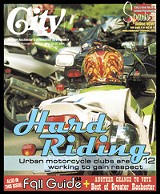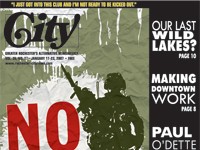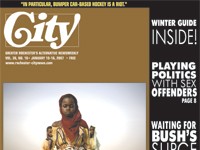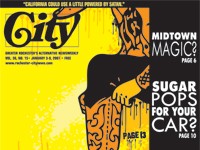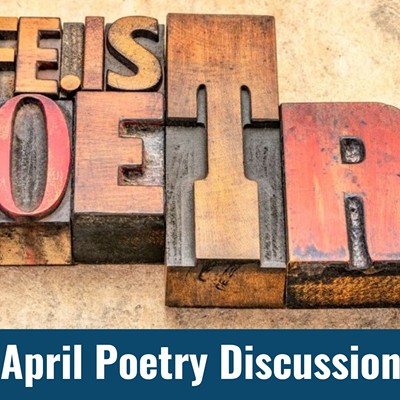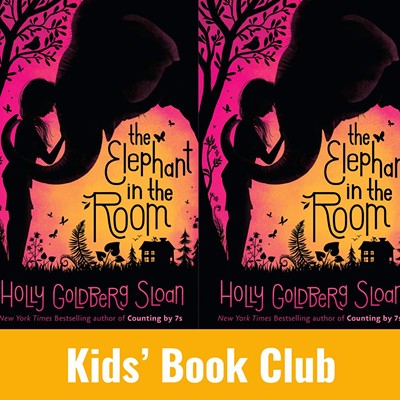[
{
"name": "500x250 Ad",
"insertPoint": "5",
"component": "15667920",
"parentWrapperClass": "",
"requiredCountToDisplay": "1"
}
]
The emcee has the audience going. But then again, it is a willing audience, already charged. The 250-member crowd laughs easily, cheers easier, and talks back. At one point he calls out, "All the females that ride raise your hand." All the women --- just about half of the audience --- raise an arm and cheer loudly. "Oh," he says, "they want me to clarify. All the females that really ride raise your hand." And the women are on their feet, roaring.
Nearly 50 motorcycle clubs were represented at the Clarion Riverside Hotel on Friday, September 17. They came in from New Jersey, Chicago, Washington, DC, and New York City. They came for the first Motorcycle Club All-Star Awards. It was billed as a gala evening, meant to be the Oscars of the urban motorcycle world.
The awards show is the brainchild of Nori Vazquez, aka Genie on a Throttle, a Rochester rider with big dreams. While the show --- the planning of which consumed her life for the past six months --- didn't exactly meet her expectations, people came. Diamond Cut Divas, Ground Assault, Curve Killaz, Cuse Road Dawgs, Jer-Z Jewelz, Double Lyte Posse, Endless Curves, and dozens more were there. Brown Suga, Slow Pain, Butta, Ninja, Snowball, Icey, Smoke, D-Block --- they were all there.
So dinner didn't get served, the music act didn't show, and some people disagreed with the winner selection --- the riders were there, they flaunted their stuff on a red carpet of sorts, and partied hard in the ROC. And if Vazquez has her way, they'll be back next year.
Last summer, Vazquez was a member of Duce Duce Crew, one of about 12 clubs in Rochester's urban sport-bike community. These are mostly black clubs, riding sport bikes. Many of the riders, at least in Rochester, are men, though more women are riding now, too. Only a member for a few months, and still learning how to ride, Vazquez started getting Duce Duce involved in community-service projects. Her focus was --- and still is --- kids.
"The first thing, when I got there," she says, "I said, 'Look, I'm not going to be in an organization that isn't charitable.' So two weeks after I got with them was our Duce Duce Day For Kids. I don't want to be involved in an organization that's not going to give. I just think when you give it always comes back to you."
A freelance artist, Vazquez got the riders over to James Madison School, took pictures of the kids on the bikes, gave out free refreshments, and taught a drawing workshop. She knew kids would love the bikes, that these riders --- hardworking black men --- would be good role models. Some parents put up a fuss, called the club a bunch of drug dealers, but the day was a success. And Vazquez wasn't going to stop there.
Last summer, at a Duce Duce meeting at the Mighty Men of Valor room on Jay Street, TNT plays an old movie on the TV and Vazquez tries to get the members excited about fundraising activities so they can contribute to more community projects: a mural at Baden Street for murder victims, care packages for troops overseas, another kids day. Members are prodded to pay dues. As soon as they finish business, they get to go out riding. The bikes are waiting outside.
A year later, Vazquez is no longer a member of Duce Duce Crew. She's on her own, riding as Genie on a Throttle, still collaborating with Duce Duce and some of the other motorcycle clubs for events. She has another kids' day planned in Genesee Valley Park, this time with some help from the city. And she is working on another kind of event, an awards show, which is taking on a life of its own. A rep from the Associated Press Sports Division wants to cover it. The urban motorcycle media will be there. People are coming from all over. It's going to be something like nobody's ever seen.
The black bike-riding community, which a few years ago was a subculture in isolated cities, is now a media-savvy national network.
"To tell you the truth," Vazquez says, "before last summer, there were probably only about three sport-bike clubs. In the past two years, the clubs have, well, they've just gotten unbelievable." It was 2003 when the movie Biker Boyz came out, an action blockbuster full of speed, noise, and stunts. It told the story of the underground African-American motorcycle racing scene in Southern California, and it launched the picture of a fringe group into the mainstream: a snapshot of freedom and danger, of the ultimate cool.
These days, all the rappers ride motorcycles. It's the new bad thing to do. In Terror Squad's new song, "Lean Back," Remy raps: "And I just bought a bike so I can ride 'til I die / With a matchin' jacket." Many of the stars of the rap and hip-hop worlds are riders in their free time, if not just in their videos. Ludacris and Wyclef have both sponsored custom car and bike shows.
The media industry has sprung up to serve the growing community of urban bikers: The magazine UrbanCyclez was founded in January 2003 with the slogan "more than a magazine, it's a way of life." There are online zines and forums, many clubs have their own website, and riders shout at each other on Internet bulletin boards from across the country. There is a National Association of Black Bikers, aimed at promoting and protecting the rights of black riders. The Black Urban Ryders Network (BURN) lists more than 300 black motorcycle clubs nationwide. And those are only the ones with websites.
At the Rochester Motorcycle Coalition's Labor Day Picnic in Genesee Valley Park, the seven member clubs are represented, there are hots on the grill, and about a dozen bikes are parked off to the side. Kids are running around, playing and vying for a turn to sit on a bike.
RMC member Robert Scott of the Tech Rydas is working the grill. He says the RMC was founded to get the different clubs talking, to organize group events, and to dispel the public idea that riders are thugs. Scott thinks the image of danger around motorcycle riding is a misperception, one that has started to change over the last five years. "That's why we do stuff like this," he says. "Everybody has a job, this is not what we do for a living. Everybody has families."
Nori tells me that the awards show is getting out of hand. She has been in the hospital three times for stress. Her blood pressure is up. She isn't getting enough help and she is getting threats and nasty messages from some of the clubs that weren't nominated.
"I had no idea they were taking it this seriously," she says. "The reason why I really have promoted and have done everything for this show [is because] it is so huge for Rochester. With the public and the people coming in to the city that won't come in any other way, it's opening a lot of doors. You go to other cities --- you go to Florida or South Carolina --- and they're pulling people from Chicago and California."
But she is afraid of being sued, and she is talking to a lawyer.
Danger has a split personality in this urban biker world. The danger of riding gives it street cred. It's what makes it real. People die riding motorcycles, and tributes to fallen riders are a big deal. A member of the RMC died on West Ridge Road this spring. All the local riders, regardless of club, came out to escort the funeral procession. A brother had fallen; another solider was lost on the road.
But at the same time, many clubs in Rochester are working to counteract the thug image that comes with the bike. The RMC organizes family-friendly picnics. Vazquez is talking with some other clubs about organizing another coalition, one that is open to all races and is community focused --- a sort of Rainbow Coalition of bikers.
Vazquez has found kindred spirits in some of the other Rochester clubs. NOYS (Nightmare On Yo Street), according to its website, has adopted the mission of "keepin today's innercity youth off tha streets, off drugs, and out tha pen." LadyMack, president of Ghetto Superstarz, has started a kids' group called the Superstarz. In exchange for good grades, the kids get rewards like CDs.
Radija Moxley is the treasurer of the MileStonez, a women's motorcycle club. She's still in the process of getting a bike. Right now she's getting her license, and taking a safety class. "We got kids and stuff," she says, "and we're not trying to kill ourselves. At least I'm not. It's really nice, it's fun, it's just something extracurricular. It's not the basis of our lives."
MileStonez president Robin Solomon has had her license for three years. To her, the safest place to be is hanging with the motorcycle clubs.
"Everybody polices their own organization," she says, "so there is no fights breaking out, no violence, it feels better. I don't mind bringing my son around them. I like it mainly for that, because it's a lot of people, but it's safe."
But the misperception is still there. "I went to a club to see how much he would charge us to have a party, he was like, 'A motorcycle club? Umm...' I said, 'Each club polices its own members, there won't be any fights breaking out, no shootings, nothing like that.'"
At 5:30 p.m. on the day of the MC All-Star Awards, Vazquez is upstairs with one of the hotel employees, almost in tears. The awards are supposed to start now, but many of the clubs are still on the road, and the red carpet is just two maroon entrance mats slapped down in the hallway. The only thing to do, she says, is pray.
But people start to trickle in. They show up in jeans and warm-up suits, garment bags over their arms. By 7 p.m., the hotel lobby is full of women in sequined dresses and men in suits, fedoras, and shined shoes. A few clubs stay in their colors. Some men wear their vests over their suit jackets. But tonight is not so much about the bikes as it is about the bike lifestyle. Very few people rode here.
And though there's a lot of talk about riding hard, riding real, and riding till you die --- nobody's riding tonight. Here, right now, the bike is a state of mind. And besides, tonight everyone is looking good. These clothes aren't for riding.
Some people wander upstairs and take a turn on the red carpet, mugging and posing, elbowing each other out of the way when someone pulls out a camera. Business cards are exchanged; I'll be putting these pictures on my website, everyone says, be sure to check it out. Two men show up wearing matching black suits with white pinstripes and fedoras; everyone goes wild. A crowd forms, laughing, slapping their legs, and teasing. The men have to pose for pictures, and shake hands. It's all in fun.
Dirty Luke, Sergeant in Arms for the Bushmen, and Soul Dawg, road captain for the Sunset Ryders, are two of the sport's old timers. Dirty Luke rides a 1000 Suzuki. "Love it," he says, "I named it my wife." Soul Dawg rides a Honda Goldwing Cruiser.
Sitting at the Labor Day Picnic sipping Bud Light out of cans, the pair is like a couple of elder statesmen; everyone comes over to shake hands and say hello. They've been on the road for 10 and 30 years respectively.
"You get teased a lot. 'You riding a crotch rocket. Why don't you get you a Harley?'" Dirty Luke says.
He remembers getting harassed when he first started riding. "We had to go sit down and have a meeting with Hell's Angels and Iron Horseman when we started. They thought we had their colors. So we had to go sit and talk to them, say 'No, we ain't got your colors, our colors represent Africa.'"
Both men wear their riding scars as proof of battle. Dirty Luke has nine pins in one leg and a bone that still sticks out funny. Soul Dawg has broken his shoulder, four ribs, his collarbone, and he was in a coma for three days.
But these are marks from falling, not fighting. Soul Dawg talks about the code of ethics within clubs. Every club has a set of bylaws and officers to enforce them. Fighting is not allowed.
"If we go someplace, and one of the club members acts up," he says, "you can get fined, you can get your patches taken away from you, depending on how bad the infraction, and then you have to work back up, build yourself back, get your colors up."
He agrees that riding is getting a lot more popular with young people in the black community, and he thinks that's a good thing.
But "young people are so hard headed," he says. "So hard headed. They've got these crotch rockets and they want to do wheelies and burnouts and everything. See that's not right. We like to get out there, a group of us get out there and just ride, ride from here to Buffalo, here to Syracuse, stay over there and then ride on back."
To truly enjoy what he loves about riding, sometimes Soul Dawg will head out on his own, to Florida, just to get away.
"I just got up early Saturday morning, packed some clothes in there and just..." he makes a motion with his hand like a bird, gliding.
When enough people have arrived at the MC All-Stars, the red carpet starts in earnest, two hours late. A line of people snakes down the hall, around the bank of escalators. Someone is put in charge of the line, allowing people down the carpet alone, in couples, or by club. Everyone gets to walk the eight feet of carpet, stop, and strike a pose. Some flash their club signs. Someone from UrbanCyclez Magazine is there filming the whole thing for a DVD, and a few random people are taking pictures. These are moments in the spotlight, and everyone who wants one, gets one. After they give their tickets they go through a security check before they can sit down.
In the ballroom, the emcee calls out to each club in turn. When called, the club stands, fists raised, and roars. Vazquez, who missed most of the red carpet, reappears. She is up on stage most of the time, jumping in, laughing, waving to people in the audience.
Awards --- glass triangles with "MC All-Star Awards" etched on them --- are given for best crew, best colors, best event, best president, best PR, best name, and a dozen other categories. Rochester's NOYS wins best colors for a male crew.
Winners, in their acceptance speeches, testify to keeping it real, showing love, and being a unified community. One winner gets up and announces, "To keep it gangsta, we always on the highway." More clapping, more cheering.
The evening wraps up with a reading of, "When Tomorrow Starts Without Me," a poem off the Internet in honor of fallen riders.
Tomorrow Vazquez will post extensive apologies and shout-outs on her website, thanking everyone for their support even though some things went wrong. But for now it's OK: it's on to the party and dancing. And then there's the after-party.
Two days after the awards, members of the Rochester Motorcycle Coalition performed the ARTWalk Alive! finale, a motorcycle mambo choreographed by Thomas Warfield. If there could be an opposite scene from the second floor of the Riverside Hotel on Friday, this was it: a sedate, predominately white crowd, wrapped in corduroy and denim and scarves, strolls East Avenue with red-cheeked toddlers in strollers and coffees in hand. The organizers make sure everyone is off the street, and the crowd waits eagerly, toes lined up against curbs. "How do they choreograph motorcycles?" one woman asks, excited.
The RMC riders ride out and circle around a group of mamboing dancers waving silk scarves. Then the dancers move to the side, and the riders take turns screaming down the street, popping wheelies and standing on their seats. The crowd oohs, kids jump up and down. The riders assemble in the middle of the street and start laying down rubber in circles, revving engines, and making their bikes backfire. Clouds of smoke are spit onto the audience, and people back away, waving at their faces, saying, "Oh my god." Police officers run into the middle of the dance before it's over, telling the riders to walk their bikes until they put on helmets.
But it wasn't all bad PR. One of a pair of little boys, walking behind an RMC member in her colors said, "That thing with the motorcycles was cool." She turned around and looked at him sharply. "You like that?" He nodded. She nodded back.
Yep, the kids like it all right.
For more information on Rochester's bike clubs, visit these websites: www.genieonathrottle.com, www.noys-mc.com, www.ghettosuperstarz.com. For information on the national scene, see www.xtremeburn.com, urbancyclez.com, and www.nabbweb.org.
Latest in Featured story
More by Erica Curtis
-
What's in the water?
Jun 14, 2006 -

Roses are red
May 3, 2006 -
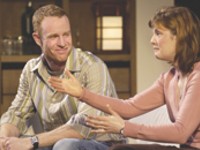
A family in circles
Mar 22, 2006 - More »
